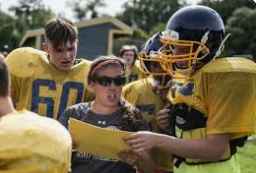Five boys formed the heart of their soccer team. Tatenda, Edzai, Anesu, Chipo and Hondo were all gifted, enthusiastic players, with Tatenda starring in goal, Edzai being strong in defence, Anesu performing heroics in midfield while Chipo and Hondo formed a prolific striking combination. One day, however, the coach decided he would change things around and put Chipo in goal, Hondo as a central defender, Edzai moved into midfield, Anesu now played just behind the striker and Tatenda took on the striker’s responsibilities. Because they all played out of position, the end result was disastrous and unacceptable. The coach had to go!
A coach of a school sporting team is in place to teach his pupils. Few would disagree that the qualities (not skills) that a coach would look to see and indeed develop would be Trust, Effort, Attitude, Creativity and Heart. By Trust, we mean that a coach must trust his players to put into practice what they have been learning; he must let them go out and play. He must trust them to do what is required of them, not make them do it or tell them what to do. Once on the pitch for the match, the coach must trust the players. Secondly, no-one would argue that Effort (hard work, graft, sweat and guts, determination, resolution, perseverance) and Attitude (confidence, positivity, belief, respect, integrity) are both essential qualities for a successful coach. Then we move on to Creativity whereby the coach needs to look for new ways of working out ways of combating difficult situations, structures or systems and combining the strengths of his players. Finally, once all the above are in place, a coach most definitely must have Heart (a passion, desire, commitment).
However, we must point out that it is essential that these qualities are developed in that order. A coach might be tempted to put Creativity first, to look for any and every opportunity and means to take advantage of whatever situation arises, to try anything that will maximise the chances of winning. Such a coach might then be tempted to release his Heart and full range of emotions into the scenario with all the energy that emanates from it. He will certainly maintain the position that Effort and Attitude are next in terms of importance while agreeing ultimately but reluctantly that his Trust in his players is helpful.
A coach who operates under such principles will not go far, however. In looking for Creativity first, he will look for loopholes to exploit, advantages to be gained no matter the cost; he will consider every means of achieving a different result. He will then be inclined to let his Heart and emotions
take over, busy gesticulating and shouting and complaining at his players, the opposition or the referee. When the emotions take over in such a way, there is no room left for Trust in his players; he is the one playing the match and forcing the result himself.
We may need to spell this out more clearly and bluntly. We must have these qualities in the right order; if we do not, then the difference will be massive. Tatenda (goalkeeper), Edzai (defender), Anesu (Midfielder), Chipo (striker) and Hondo (striker) in that order, in those positions, will perform well as a team but put Chipo in goal, Hondo as a central defender, Edzai in midfield, Anesu just behind the striker and Tatenda as the striker and you will have a disaster. Similarly, apply the qualities of Trust, Effort, Attitude, Creativity and Heart in that order and the team will flourish; put Creativity first, Heart second, followed by Effort and Attitude with Trust at the very end and the result will not benefit the pupils. In other words, the difference is found in the order of the initials of the players and the qualities, in other words between TEACH and CHEAT; there is little difference between the two words (only the order of the letters) but there is a vast difference between the functions.
The coach who applies Creativity, Heart, Effort, Attitude and Trust is cheating the players, cheating them out of honour, progress and of understanding. Cheating is teaching nothing. Cheating in academics is when a teacher gives the pupils the answer; the same applies in sport, when a coach gives his players the answer. Coaches in our schools need to understand that their responsibility is to teach not to coach. To do that, they need to get everything in the right order. There is no place to cheat in school sport, only to teach. Have we spelt that out clearly?




